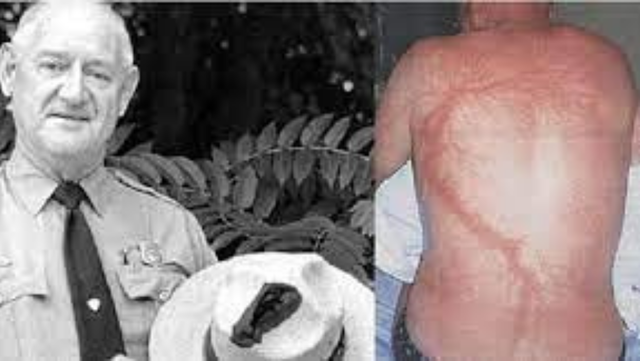Park ranger Roy Sullivan was struck by lightning seven times throughout his life and survived each time. Sullivan is recognized by Guinness world records as the person struck by lightning more recorded times than anybody else.
Roy Sullivan was born in Greene County, Virginia on February 7, 1912. He grew up in the blue ridge mountains and was one of eleven children. Roy began working as a park ranger at Shenandoah national park in 1936.
1st strike:
In April 1942, Sullivan took shelter in a newly constructed fire lookout tower. At the time of the incident, the tower had no lightning rod and the building was struck eight times. Inside the tower, fire was jumping all over the place. Sullivan fled the building and was struck within a few feet of scampering out the door. The lighting burned a half-inch strip across his leg, hit his toe, and burned a hole in his shoe.
2nd strike:
In July 1969, Sullivan was driving his truck on a mountainous road when a nearby tree was struck by lightning and deflected into the open window of his truck, striking Sullivan. The strike burned off his eyebrows, eyelashes and set his hair on fire. He was also left unconscious, with the truck rolling precariously to a halt near the edge of a nearby cliff. Normally the metal body of a vehicle offers protection by acting as a Faraday cage.
3rd strike:
In July 1970, Sullivan was out in his front yard, when lightning struck a nearby transformer. It jumped from the transformer, striking Sullivan's left shoulder, searing it like a lump of steak.
4th strike:
In the spring of 1972, Sullivan was at work inside the station at Shenandoah national park, when lightning struck again, setting his hair on fire. Sullivan dashed for the restroom to put the flames out, but his head wouldn't fit under the tap and had to use a wet towel instead.
5th strike:
On August 7, 1973, Sullivan was patrolling the park, when he spotted a storm cloud. He drove away in the opposite direction like a bat out of hell. When he was satisfied that he was at a safe distance, he hopped outside the truck and was struck by a bolt of lightning. The lighting moved down his left arm and left leg, knocking off his shoe. It crossed over to his right leg just beneath the knee. Sullivan crawled back into his truck to retrieve a can of water to douse over his hair which was on fire.
6th strike:
On June 5, 1976, Sullivan was strolling along outside, when he tripped, injuring his ankle. He noticed storm clouds, rose to his feet, and attempted to flee the area. He was struck again resulting in his hair catching fire.

Love Irish history? Share your favorite stories with other history buffs in the IrishCentral History Facebook group.
7th strike:
On June 25, 1977, Sullivan was fishing from a local pond one morning, when he was struck a seventh time. The lighting hit the top of his head setting his hair on fire. The lightning traveled down, burning his chestand& stomach. Sullivan fled to the sanctuary of his car. When he reached the car, a hungry bear appeared, and strolled over to his fishing line to steal his trout. Sullivan had to jump out of his car to scare the bear away, with his singed hair, still smoldering on his head.
Shenandoah National Park, superintendent R Taylor Hoskins documented all seven lightning strikes. Sullivan also claimed he was struck by lightning as a child while helping his father cut wheat. The lighting struck the scythe without causing injury. Nobody else was present when it occurred so it couldn't be verified.
According to the BBC, the odds of being struck by lightning are 300,000/1, with 24,000 people struck and killed a year.
Despite a Guinness World Record and minor fame, Sullivan suffered socially as a result of the lightning strikes. People were petrified of being anywhere near him out of fear of being struck themselves. At one stage, his wife was out hanging clothes in their backyard and when Sullivan popped out to give her a hand, she was struck by lightning.
Roy Sullivan died in tragic circumstances on September 28, 1983.
This article was submitted to the IrishCentral contributors network by a member of the global Irish community. To become an IrishCentral contributor click here.




Comments